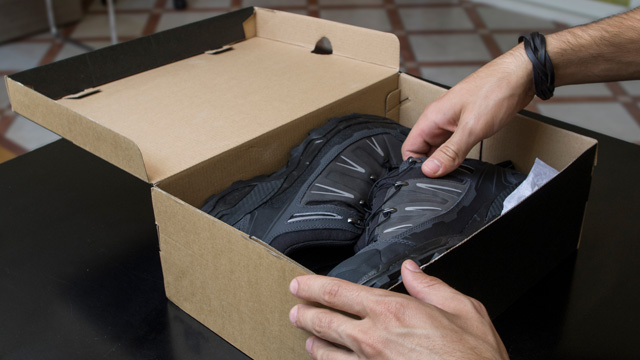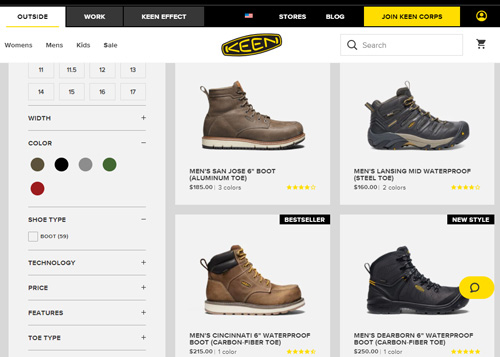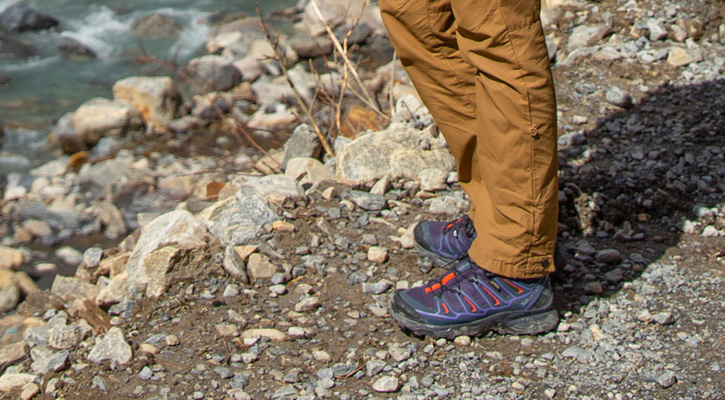
Choosing the right hiking shoes can make or break your outdoor adventures.
When it comes to Keen and Salomon, each brand offers unique features suited to different needs.
Keen shoes are known for their comfort and toe protection, making them ideal for hikers who prioritize foot safety and comfort on rocky trails.
Salomon, on the other hand, excels in providing traction and support, perfect for those tackling challenging terrains. You might find Salomon better suited for varied conditions as their shoes often have more advanced technology for stability.
Consider the type of hiking you do and your personal comfort preferences when deciding between these two reputable brands.
Brand Overview
The video will be loaded from YouTube.com, a third party. If you play it, you accept their terms of service, and their use of cookies.
Learn about two respected brands in the outdoor industry, Keen and Salomon.
Both have a strong presence and unique innovations in hiking footwear. Gain insights into their history, commitment to technology, and reputation.
History and Reputation of Keen and Salomon
Keen, founded in Portland, Oregon, in 2003, is known for creating comfortable, durable shoes. The company gained fame with its protective toe design, which became a favorite among outdoor enthusiasts. Keen values sustainability, focusing on eco-friendly practices and materials. This commitment has helped build its positive reputation.
Salomon, on the other hand, originated in the French Alps in 1947. Over the years, it’s become a leader in producing high-performance sports gear. Salomon is renowned for excellent craftsmanship and innovation. Its reputation extends beyond hiking shoes to include skis and snowboards. The brand is trusted by athletes worldwide.
Innovation and Technology in Footwear
Keen is recognized for its innovative products and technologies.
For instance, its shoes feature the KEEN.DRY waterproof membrane, which keeps your feet dry without sacrificing breathability. Keen also incorporates ecological practices by using environmentally safe materials in its manufacturing process.
Salomon excels in creating footwear with advanced technology. Contagrip soles provide excellent traction on different terrains. The brand prioritizes innovation with features like SensiFit™, which ensures a snug fit. Salomon continues to integrate sustainable practices while keeping high standards in performance.
Both brands show a dedication to enhancing outdoor experiences through technology and thoughtful design.
Design and Materials
The video will be loaded from YouTube.com, a third party. If you play it, you accept their terms of service, and their use of cookies.
When choosing hiking shoes, design and materials play a crucial role. Key features include aesthetics, functionality, quality, durability, and environmental considerations.
Aesthetics and Functional Features
Keen and Salomon both offer hiking shoes with unique designs.
Keen shoes often have a broader toe box, providing more comfort during long hikes. They are known for their rugged look, suitable for demanding trails.
Salomon, on the other hand, focuses on a sleek and sporty appearance, appealing to those who prefer a modern style.
In terms of functionality, Salomon enhances its designs with Gore-Tex lining for waterproof capabilities and breathable membranes to keep feet dry. Keen uses rubber outsoles to ensure grip and stability, along with protective toe caps for added safety. Each brand prioritizes combining style with features necessary for hiking.
Material Quality and Durability
Nubuck leather and synthetic materials are commonly found in hiking shoes by both Keen and Salomon.
Keen often uses nubuck leather for its durability and appealing texture. When it comes to synthetic options, they provide a lighter feel, crucial for longer hikes.
Salomon excels with its use of Vibram soles known for excellent traction. The shoes are often reinforced with durable synthetic meshes, which adds to the longevity without depriving flexibility. Both brands are committed to providing shoes that withstand rugged terrains and physical stress, ensuring they last through numerous hikes.
Environmentally Friendly Options
For eco-conscious hikers, both brands offer some environmentally friendly choices.
Keen provides a range of vegan-friendly options, free from animal products, appealing to those with ethical preferences. Keen also uses recycled materials in some designs to lessen environmental impact.
Salomon is also making strides toward sustainability by incorporating reusable materials where possible.
Their approach includes lightweight designs aimed at not only reducing ecological footprints but also enhancing the hiking experience. Both brands recognize the importance of environmentally sustainable options for the outdoors.
Performance in Outdoor Activities
When choosing between Keen and Salomon hiking shoes, consider their traction, comfort, and weather resistance. These factors are crucial for making the most out of your hiking experience. Here, we compare how each brand handles different outdoor challenges.

Traction and Stability on Various Terrains
For stability on rocky terrain and technical trails, both brands offer distinct strengths.
Keen hiking boots feature a thicker rubber outsole, which offers good traction and stability on uneven surfaces. This makes them a strong choice for general hiking and climbing.
Salomon shoes, especially their trail running shoes, are known for being lightweight with excellent traction. Their Contagrip outsoles cater to various terrain types, providing a secure grip during faster-paced activities. Salomon footwear is ideal for those who prioritize speed and maneuverability.
Comfort and Support during Extended Use
Keen hiking shoes emphasize comfort, with ample cushioning and wide toe boxes. They excel in providing support during prolonged use, making them suitable for long hikes. The cushioning helps in reducing foot fatigue.
Salomon’s design focuses on snug fits with supportive midsoles. This design is beneficial for trail runners and those requiring steadiness. The narrower fit offers precise control but may need adjustment for wider feet. Both brands ensure ankle support, but Keen may offer slightly more due to its robust build.
Weather Resistance and Breathability
In terms of weather resistance, Keen excels with its waterproof technologies, making its shoes suitable for wet conditions. This is a crucial factor if you’re hiking in diverse and damp environments.
Salomon, with its GORE-TEX lining, provides weather protection while maintaining breathability. Its breathable material prevents overheating during active pursuits. Salomon shoes are likely the better choice if you’re looking for a mix of water resistance and airflow.
Both brands strike a balance between protection and comfort. Your decision may depend on whether you value waterproofing or breathability more in your outdoor footwear.
Fit and Comfort
When choosing between Keen and Salomon hiking shoes, fit and comfort are crucial aspects to consider. Both brands offer unique features that cater to different foot types and enhance the comfort you experience on the trail.

Salomon hiking boots
Comparing Fit for Wide and Narrow Feet
Keen is known for its roomier toe box, which provides more space for those with wide feet. This extra room can be beneficial during long hikes, as it reduces the chance of blisters and discomfort. Keen’s Metatomical Footbed supports your arches, ensuring a more personalized fit.
On the other hand, Salomon tends to cater more to people with narrow feet. The snug fit offers a secure feeling, essential for navigating tough terrains. Salomon often features precise lacing systems that allow adjustments for the best fit, providing extra stability and control during hikes.
Advanced Technologies for Foot Comfort
Both Keen and Salomon use advanced technologies to maximize comfort.
Keen usually includes EVA insoles and Ortholite footbeds. These materials offer great cushioning and shock absorption, important for reducing fatigue during lengthy hikes. Keen’s toe protection feature also helps shield your toes from rocky paths.
Salomon, renowned for its supportive cushioning, frequently incorporates Ortholite footbeds across its shoe range. These footbeds keep your feet comfortable by wicking away moisture, which helps in maintaining a healthier foot environment. Salomon’s shoes often emphasize cushioning around the heel, ensuring good shock absorption and support on uneven surfaces.
Pricing and Value for Your Money
When it comes to choosing between Keen and Salomon hiking shoes, price and value are crucial factors. It’s important to consider the price range of different models and assess how they hold up over time.
Comparing Prices Across Models
Keen and Salomon offer a broad spectrum of hiking shoes, ranging from budget-friendly options to premium models.
Keen’s lineup generally leans towards affordability, making it a go-to for budget-conscious buyers. You can find waterproof shoes and lightweight hiking boots within a moderate price bracket, catering to everyday hikers seeking both comfort and durability.
Salomon, on the other hand, tends to price its waterproof hiking boots and best hiking shoes higher due to advanced technology and materials.
This brand focuses on performance and tends to attract enthusiasts who prioritize cutting-edge features. The best hiking boots from Salomon might come with a higher price tag but offer exceptional quality.
Long-Term Investment and Cost-Effectiveness
Choosing hiking footwear also depends on the long-term value and cost-effectiveness.
Keen is often praised in customer reviews for its durability and value, making it a sensible choice for casual hikers seeking lasting comfort without breaking the bank.
Their models tend to last through numerous hikes, maintaining comfort and support.
Meanwhile, Salomon shoes, known for their innovative technology and superior design, offer a strong long-term investment if you’re passionate about hiking.
They might have a higher initial cost, but their quality construction can withstand frequent, intense use.
For those willing to invest in performance, these shoes promise robust durability and feature-rich designs.
